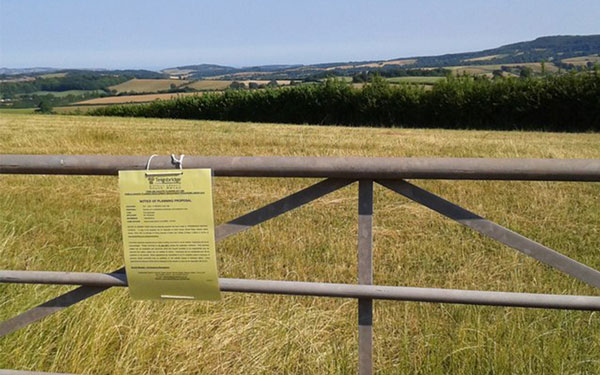Government proposes reforms to national planning policy
The Government has recently unveiled a consultation on proposed reforms to the National Planning Policy Framework, marking one of the most significant overhauls to the planning system in years.

These changes are set to have far-reaching impacts on how our communities grow, develop, and thrive in the years ahead.
Why this planning policy consultation matters
The proposed changes are some of the most significant in recent years and are aimed at supporting the Government’s wider objectives “to achieve sustainable growth in our planning system” and “to achieve economic growth and build 1.5 million new homes”.
It covers most of the planning system – some of the key proposals include:
- Reinstatement of mandatory housing targets including at the local authority level.
- Local authorities must meet “an area’s identified housing need”.
- Local authorities should undertake a green belt review where they are unable to meet housing, commercial or other needs without altering green belt boundaries.
- Introduces the concept of the grey belt in the Green Belt.
- Rather than district-wide design coding, proposes the focus should be on the preparation of localised design codes, masterplans and guides “for areas of most change and most potential”
- Making it easier to build on brownfield sites.
- Strengthen strategic planning and cross-border working.
- A focus on the provision of more affordable housing, in particular for social rent
- Support economic growth including that local authorities should identify appropriate sites for commercial development “which meet the needs of a modern economy”.
- Support for renewable and low carbon energy generation, including onshore wind & renewable and low carbon energy.
- Will not be implementing the Infrastructure Levy that would have replaced Section 106 Agreements and the Community Infrastructure Levy.
- Increases in some planning fees.
- Local authorities that fail to produce local plans quickly enough may face sanctions.
For councils, these changes are not just technical adjustments—they will directly affect the ability to meet local housing needs, manage growth sustainably, and protect the character of communities. From the way housing targets are set to the potential easing of restrictions on green belt land, the implications for local planning and development are profound. This consultation is a chance to ensure that the voices of your communities are heard and that local needs and priorities are considered in the final policy
A copy of the consultation document can be found here, alongside a Written Ministerial Statement and a track-changed draft text of the new NPPF. The consultation closes at 11.45 pm on 24 September 2024.
Join us at our Connect Event
As the Government’s consultation draws to a close on 24 September, we are hosting a Connect Event on 5 September designed to help councils navigate these proposed changes and craft informed responses. Here’s why attending this event is essential:
- Understand the scope and impact: The event will break down the key proposals and what they mean. With such sweeping changes on the table, it’s vital that councils explore the implications for their communities.
- Stay updated on the latest developments: Planning consultant Andrew Towlerton, an expert in navigating the complexities of the planning system, will provide the latest insights. This is your chance to get the most up-to-date information and guidance.
- Shape your council’s response: The event will support you in formulating your council’s response to the consultation. Ensuring that your council’s views are effectively communicated can influence how these reforms are finalised.
- Contribute to a collective voice: The event will also help shape the collective response via NALC, reflecting the shared concerns and priorities of councils across the country. Your input will strengthen the overall advocacy for our sector.
Cara Stobart, our County Officer, emphasises, “We’re at an important moment for local planning, and this Connect Event (and consultation) is an opportunity for parish and town councils to have their voices heard. These proposed reforms will shape our communities for years to come, so it’s important that we come together to understand the changes and advocate for what’s best in our areas.”
Don’t miss the opportunity
This Connect Event is more than just an information session—it’s an opportunity for councils to come together and share their perspectives on the proposals, and help influence the future of planning policy in our country. Your participation is crucial in ensuring that local perspectives are front and center in this consultation.
Join us, contribute to the conversation, and support your council to navigate and respond to these planning reforms.
We look forward to your participation in what promises to be a highly informative and collaborative session.Book your place on our Connect Event
Additional information
Changes to Permitted Development Rights | Have your say!
The government is proposing further changes to permitted development rights, and we would like your views on how we should respond

Permitted Development Rights are rules which allow certain types of works to be carried out without the need for planning permission. They derive from permissions granted by Government, rather than the local authority.
The Government is proposing further changes to permitted development rights, including:
- A new permitted development right to support temporary recreational campsites.
- Changes to the existing permitted development rights for solar equipment and a new permitted development right for solar canopies.
- Amendment to the existing permitted development right which allows local authorities to undertake certain development. This change would allow bodies to undertake the work on behalf of the local authority.
- Changes to the existing permitted development right allowing for the temporary use of buildings or land for film-making purposes.
DALC has held a longstanding view which does not support an across-the-board extension of permitted development rights in the planning system. We believe that decisions about development should be made at the local level, and policies should be the prerogative of local authorities in their Local Plans, or Neighbourhood Planning Groups.
However, we recognise a blanket rejection to proposals would not be supportive of other positions we hold such as initiatives to support the climate emergency and the rural economy.
Therefore, we are asking members for their views in our quick snapshot survey. Your views will help us to determine whether to respond to the consultation, and to what degree we support or oppose the proposals.
Our snapshot survey will close on Wednesday 12 April 2023.
Any council concerned about the proposals can also respond directly to the consultation, which closes on 25 April 2023.
Related Content
- Read DALC’s Planning Policy Statement
- Get involved in DALC’s Committees
Rural roads survey to inform future DALC policy position

DALC is running a Rural Roads survey to gather views of our members’ on the issue of speed on rural roads, specifically single-track lanes.
DALC’s County Committee considers policy matters relating to parish and town councils in Devon and is considering the issue of speed on rural roads. The County Committee has set up a Task and Finish Group to gather more information, and is conducting an online survey to gather the experiences of local councils in Devon. Responses to this survey will inform any future DALC policy position in this area.
The issue of speed on rural roads, especially single-track lanes, is one that often concerns local communities. Vehicles moving at high speeds on narrow roads are not only a potential safety hazard to other road users but can discourage active travel methods such as walking and cycling. For these reasons and others it is not uncommon for parish and town councils to request a lower speed limits for these roads near their communities, or to propose that all rural roads of a certain type (usually single track lanes) should have lower speed limits.
Speed limits are a matter of national policy and Devon County Council operates within the Department for Transport’s regulations. The national policy is clear that on rural roads the national speed limit of 60mph should apply, that it is a maximum not a desirable speed, and that road users should moderate their speed according to local conditions. Local variations to the national speed limit are regarded as confusing to drivers and likely to raise, rather than lower, the risk of collisions. As such, exceptions to the national speed limit on rural roads are only applied to stretches of road with a significant reliable record of speed related accidents. It would require a change of national policy to allow for lower speed limits on rural roads within Devon, and to affect this change will require long and extensive discussion with both national and local bodies.
As such, any decision to adopt a policy position regarding speed limits on rural roads should not be taken lightly, and we would like to gather as many views as possible on this issue from our members before making any further decisions, and would be grateful if you could complete the survey.
The closing date for the survey is Friday 6 May 2022, and if you have any technical problems or questions regarding the survey, please contact us.
Related Links
For more information on our County Committee and the work it does, see our Committees page.
Local Nature Recovery Strategies – DEFRA consultation
You don’t have permission to view the content
The ‘Right to Contest’

Has your council ever used the ‘Right to Contest’ for unused land to be brought back to use in your community? If yes, NALC is interesting in hearing you.
MHCLG are looking to refresh the Right to Contest process looking at its effectiveness and usefulness and have engaged with NALC to work with local councils. Essentially the Right to Contest is a right that any member of the public or body has to ‘contest’ any land owned by a public body that is unused or underused which could be brought back into use. The Right to Contest was previously known as the Community Right to Reclaim Land.
The Right to Contest has two strands: strand 1 covers central government bodies on a voluntary, non-statutory basis, and is administered by the Cabinet Office. Strand 2 covers bodies (local authorities and other certain public bodies) set out in Schedule 16 of the 1980 Act, and is administered by MHCLG.
Where a request is made under Strand 2 of the Right to Contest about a particular piece of land, MHCLG will communicate with the relevant landowner to identify its status. The decision on whether to direct that the land be released will be made on the basis of whether the land or property is in use or whether it is likely to be used in a suitable period of time.
MHCLG would be grateful if member councils could please complete this very short snapshot survey which will help inform how MHCLG progresses its refresh of Strand 2 of the Right to Contest. It will take a few short minutes to complete. Even if you nothing about this right – please complete the survey.
The deadline for completion of the survey is 17:00 on Friday 9 October.
Complete NALC's snapshot survey
